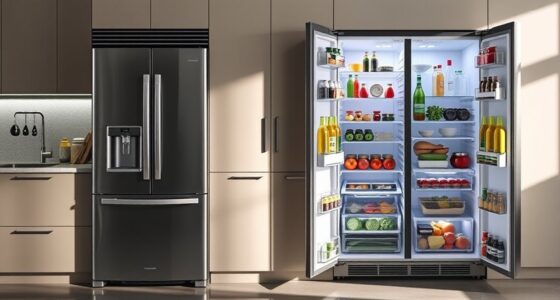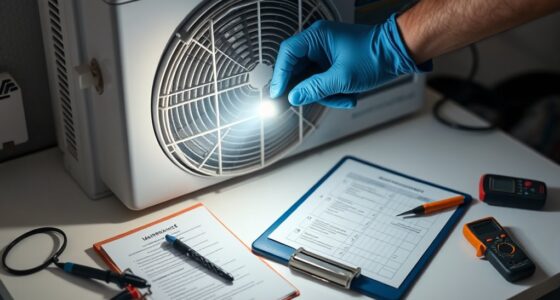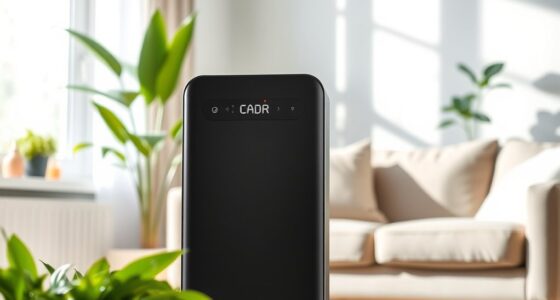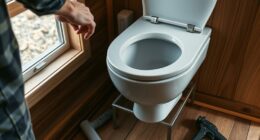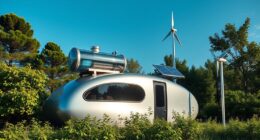When choosing appliances for off-grid living, focus on energy efficiency and compatibility with your solar system. Opt for LED lighting, low-power refrigerators, and energy-star-certified devices to reduce power draw. Prioritize solar water heaters and induction cooktops to maximize renewable energy use. Keep track of your energy capacity, and consider installing management systems to prevent overloads. Selecting the right appliances helps guarantee reliable, sustainable power—stay tuned to learn more about optimizing your off-grid setup.
Key Takeaways
- Prioritize energy-efficient, Off-Grid-specific appliances with high Energy-Star ratings to maximize solar power usage.
- Select low-power, compact appliances like portable refrigerators and LED lighting for better energy management.
- Use solar-powered or energy-efficient kitchen devices, such as induction cooktops and solar water heaters.
- Incorporate energy management systems to monitor consumption and prevent system overloads.
- Focus on appliances that support sustainability, self-sufficiency, and long-term off-grid living.
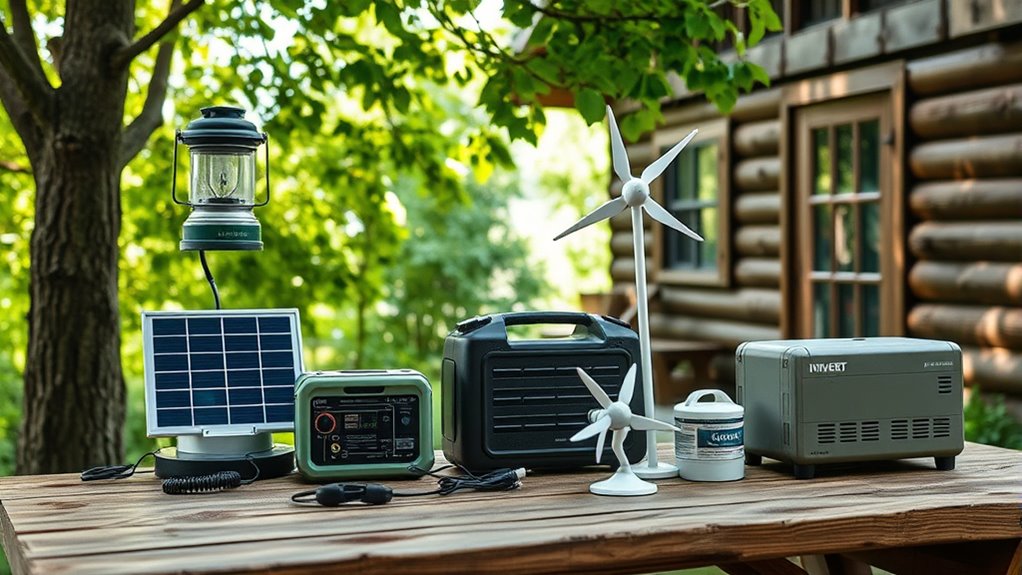
Living off the grid requires careful selection of appliances that balance functionality with energy efficiency. When you’re not connected to traditional power sources, every watt counts, so choosing devices that maximize your solar power setup is essential. Solar power becomes the backbone of your energy system, so appliances designed to run efficiently on limited energy are your best bet. Look for products labeled as energy-efficient or those with low power consumption ratings. These appliances help you make the most of your solar panels, ensuring you have reliable power without draining your batteries too quickly.
Prioritize energy-efficient appliances to maximize your solar power and ensure reliable, sustainable off-grid living.
You’ll want to prioritize appliances that are specifically designed for off-grid living or are energy-star certified. For example, LED lighting consumes considerably less energy than incandescent bulbs and lasts longer, making it a smart choice for prolonged use. When selecting a refrigerator, opt for models that are designed for low power consumption, as traditional refrigerators can be quite demanding on your energy reserves. Consider portable or smaller fridges that use minimal electricity, and always check their energy efficiency ratings before purchasing. For heating and cooling, look for energy-efficient options like small space heaters or fans that operate on minimal power and are compatible with your solar setup.
In the kitchen, choose appliances like induction cooktops or solar-powered appliances that are designed to work with renewable energy sources. These appliances typically have better energy efficiency, meaning they use less power to perform the same task as conventional counterparts. When it comes to water heating, solar water heaters are an excellent investment, harnessing free solar energy to provide hot water without straining your system. Additionally, washing machines should be chosen for their low energy and water consumption, and you might consider hand-washing or using a solar-powered washing device if available.
In all cases, it’s important to understand your solar power capacity and plan your appliance use accordingly. Balancing energy efficiency with necessary functionality ensures you won’t overtax your system or run out of power unexpectedly. Installing a good energy management system can help monitor your consumption and optimize your appliance use throughout the day. This way, you maintain a steady supply of energy, reduce waste, and prolong the lifespan of your batteries and solar equipment. Remember, the key to successful off-grid living isn’t just having the right appliances but choosing ones that work harmoniously with your solar power system, ensuring you stay comfortable, self-sufficient, and sustainable in your off-grid home.
A solid understanding of creative practice can help you innovate in your off-grid lifestyle by finding new ways to optimize energy use and resourcefulness.
Frequently Asked Questions
How Do I Calculate the Power Needs of Off-Grid Appliances?
To calculate your off-grid appliances’ power needs, start by checking each appliance’s wattage. Add up these wattages to find the total energy requirement. Consider factors like solar panel efficiency to guarantee they generate enough power, and size your inverter accordingly to handle peak loads. Also, account for daily usage hours. This way, you’ll have a reliable system that meets your energy demands without overloading.
What Are the Best Energy-Efficient Appliances for Off-Grid Homes?
You should look for appliances with the Energy Star label, as they meet strict efficiency standards and save you energy. Prioritize high appliance efficiency by choosing models that use less power and generate less heat, reducing your overall energy needs. Compact, multi-functional appliances also help conserve power, making your off-grid home more sustainable. By selecting energy-efficient appliances, you’ll lower your energy consumption and extend your off-grid system’s lifespan.
Can Solar-Powered Appliances Replace Traditional Household Appliances?
Solar-powered appliances can replace traditional household ones, but they’re not without limitations. Think of them as a new crew in your household, capable but still learning the ropes—solar appliance limitations mean some devices may not perform as well or require more energy. Off-grid appliance costs tend to be higher upfront, but they save you money long-term. With careful planning, solar appliances can meet your needs, just with some compromises.
How Long Do Batteries Last With Continuous Appliance Use?
Your batteries typically last 3 to 5 years with continuous appliance use, but proper battery maintenance can prolong this lifespan. Regularly check and top off your batteries, and make sure your inverter is compatible to avoid overloads. Using energy-efficient appliances reduces strain on your system, helping your batteries perform better and last longer. Remember, keeping your batteries well-maintained and ensuring inverter compatibility are key to reliable off-grid power.
Are There Portable Appliances Suitable for Temporary Off-Grid Setups?
Yes, there are portable appliances perfect for temporary off-grid setups. You can use portable fridges to keep your food fresh without heavy, permanent units, and lightweight cooktops make cooking easy without bulky equipment. These appliances are designed for mobility, energy efficiency, and convenience. With the right portable appliances, you can enjoy off-grid living temporarily without sacrificing comfort or functionality.
Conclusion
Choosing the right appliances for off-grid living means balancing power and simplicity. While modern gadgets offer convenience, they can also drain your limited energy supply. Sometimes, embracing minimalist solutions brings greater independence and peace. Remember, less reliance on complex tech often leads to more freedom and resilience. In the end, it’s not just about the appliances you choose, but how they help you create a sustainable, self-sufficient life—where simplicity becomes your greatest strength.


